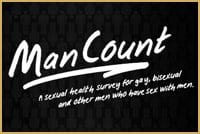Researchers will soon be hitting Davie Village hotspots, looking for men to fill out a sexual health survey and give a finger-prick blood sample.
The ManCount survey — part of a national study by the Public Health Agency of Canada — will measure rates of HIV and other sexually transmitted infections affecting gay, bisexual and other men who have sex with men.
The survey starts Aug 1 and runs until 1,500 men have been questioned. The team will visit bars, nightclubs and cafés in the Davie Village, and all information they collect will be kept confidential and anonymous.
And, anyone who takes part will get $10, says local ManCount spokesman Michael Kwag.
“We may be doing street corners,” he says. “We’re also going to be at Pride.”
With the rate of HIV and syphilis infection in Vancouver rising each year, researchers want to know how common other sexually transmitted diseases are in the city.
The data from ManCount will allow them to better understand, monitor and prevent these infections.
Researchers are particularly interested in Human Papillomavirus (HPV) — it’s one of the most common sexually transmitted infections in Canada, according to Health Canada. Gay men are at an increased risk of anal cancer caused by HPV, but health officials do not how common it is among men.
ManCount results will be used to advocate for programs to prevent anal cancer, such as HPV vaccine programs and anal pap testing. These services are not currently available for men in British Columbia, and having data on the prevalence of HPV in the gay community is essential to developing these programs.
But, says Kwag, in order for the survey to be successful, it needs to hear from all areas of the community.
“We need to ensure we have a broad cross-section of the community,” he says. “We need to really have a lot of fact in this data because [it] will be the basis of a lot of prevention efforts in the future.”
ManCount is being done in conjunction with Vancouver Coastal Health, the BC Centre for Disease Control, the Community-Based Research Centre, the BC Centre for Excellence in HIV/AIDS and the Health Initiative for Men.
It’s part of a national study involving several Canadian cities, including Montreal, Toronto, Ottawa, Winnipeg and Victoria. The budget for the Vancouver project is $150,000, says Kwag.
“Pending funding, we will be doing this study every two or three years,” he says.

 Why you can trust Xtra
Why you can trust Xtra


